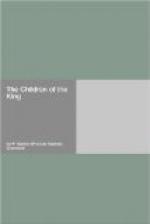At last they struck the long beach and began to trudge through the sand.
“And what shall we do to-morrow?” asked Sebastiano.
Ruggiero was whistling loudly to show his younger brother that he was not tired nor afraid of anything. At the question he stopped suddenly, and faced the blazing blue sea.
“We can go to America,” he said, after a moment’s reflection.
Little Sebastiano did not seem at all surprised by the proposition, but he remained in deep thought for some moments, stamping up a little hillock of sand between his bare feet.
“We are not old enough to be married yet,” he remarked at last.
“That is true,” admitted Ruggiero, reluctantly.
Possibly, the close connection between going to America and being married may not be apparent to the poor untutored foreign mind. It would certainly not have been understood a hundred miles north of Sebastiano’s heap of sand. And yet it is very simple. In Calabria any strong young fellow with a decently good character can find a wife with a small dowry, though he be ever so penniless. Generally within a week, and always within a fortnight, he emigrates alone, taking all his wife’s money with him and leaving her to work for her own living with her parents. He goes to Buenos Ayres or Monte Video. If, at the end of four, five or six years he has managed to increase the money so as to yield a small income, and if his wife behaves herself during his absence, he comes home again and buys a piece of land and builds a house. His friends do not fail to inform him of his wife’s conduct, and he holds her dowry as a guarantee of her fidelity. But if he fails to enrich himself, or if she is unfaithful to him, he never comes back at all. It is thus clear that a penniless young man cannot go to America until he is married.
“That is very true,” Ruggiero repeated.
“And we must eat,” said Sebastiano, who knew by experience the truth of what he said.
“And we are always hungry. It is very strange. I am hungry now, and yet we had the beans only this morning. It is true that the plate was not full, and there were two of us. I wish we were like the son of Antonio, who never eats. I heard his mother telling the chemist so last winter.”
“He is dead,” said Sebastiano. “Health to us!” he added, according to custom.
“Health to us!” repeated Euggiero. “Perhaps he died because he did not eat. Who knows? I should, I am sure. Is he dead? I did not know. Come along! If Don Antonino is not away we shall get some bread.”
So they trudged on through the sand. It was still very hot on the yellowish white beach, under the great southern sun in September, but the Children of the King had been used to bearing worse hardships than heat, or cold either, and the thought of the big brown loaves in Don Antonino’s wine-shop was very cheering.




